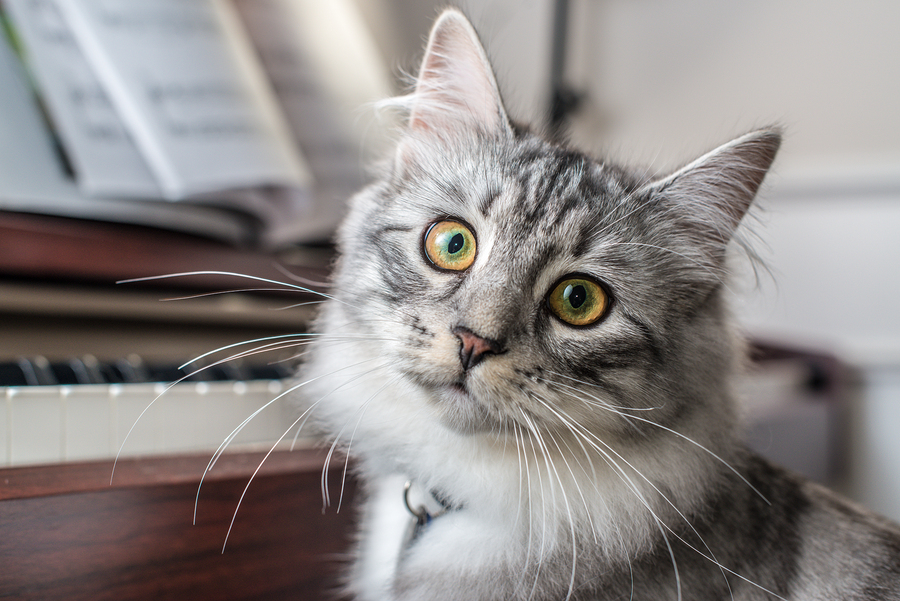The power of music is as old as the first human heartbeat. Music communicates emotions, inspires creativity, and provides healing. From 1697, literature gives us William Congreve’s play, “The Mourning Bride” with the famous opening line: “Music has charms to sooth a savage breast, to soften rocks, or bend a knotted oak.” Scores of studies show evidence of music’s use for human health and wellbeing. A new study by the British Academy of Sound Therapy (BAST) found certain types of music listened to for specific lengths of time boosts mood states.
Curiosity asks, can music tame the tabby?
Music Cats Like
An increasing number of studies researching the effects of music on cats suggest that cats show physiological and behavioral responses to certain types of music. A study in 2015 showed that cats under general anesthesia experienced changes in respiratory rate and pupil diameter when exposed to classical music (Barber’s ‘Adagio for Strings (Opus 11)’, pop (Natalie Imbruglia’s ‘Thorn’), and heavy metal (AC/DC’s ‘Thunderstruck’). As you may guess, the cats appeared more relaxed with the classical music, pop garnered a “meh” response, and heavy metal rocked the cats, resulting in increased respiratory rate and pupil diameter, indicating a stress response.
A study by Charles Snowdon, an animal behaviorist at the University of Wisconsin, and David Teie from the University of Maryland School of Music, evaluates how cats respond to classical music compared to cat-specific music. Cat-specific music isn’t cat sounds but music that features pitch, tempo, and timbre that cats find naturally appealing; for example, the tempo of purring, the suckling sound during nursing, and frequencies in feline vocal range, which is two octaves higher than for humans. The four sound-samplings used were Johann Sebastian Bach’s ‘Air on a G String’, Gabriel Fauré’s ‘Élégie’, and two cat-specific compositions written by David Teie. Purring and rubbing against the speakers were considered positive responses, while hissing, an arched back, and piloerection (erect fur) were deemed negative responses.
More cats displayed positive responses toward the specialized cat music than the classical selections. The researchers suggest that using cat-specific music to calm anxious cats provides auditory enrichment in the environment, which helps reduce separation anxiety for pets at home alone or newly adopted pets.
Calming Cats With Music
In a recent study, researchers from Louisiana State University expanded on the positive results in the earlier cat-specific music study to further examine the calming effects of cat music during a physical exam at a veterinary clinic. Over a period of three sessions, 20 cats heard 20 minutes of classical music, Gabriel Fauré’s ‘Élégie’, cat music, David Teie’s ‘Scooter Bere’s Aria,’ or silence before the physical exam. The cats were assessed using three scores: cat stress scores based on behavior and body postures, handling scale scores based on cats’ reactions to handlers, and neutrophil:lymphocyte ratios from blood samples to measure physiological stress.
The distinct results showed significantly lower cat stress scores and handling scale scores in cats who listened to cat music over classical music or silence. All cats showed a positive response to the cat music regardless of the age, breed, sex, neutered or not, or whether they lived indoors or out. The same results weren’t reflected in the neutrophil:lymphocyte ratios but researchers think the 20-minute music dose wasn’t long enough to affect this marker.
The cats’ reduced stress after listening to cat music allowed for a more thorough physical exam and accurate vitals. The researchers conclude that playing cat-specific music in the waiting rooms reduces anxiety and increases the quality of care in the vet clinic, which benefits the welfare of the cat.
Music is a form of communication that evokes an array of emotions. It can boost mood, reduce stress, and improve physical and mental health and wellbeing. Science shows cats also reap health benefits from music. We may leave on the radio for our cats at home or play classical music in the car for them to help promote a sense of calm, but because music composed for humans appeals to us in pitch and rhythm, often played in a loud volume, it usually doesn’t appeal to cats. Some music may overstimulate them or increase fear. Cats may not groove to the music we listen to, but if you want to add a layer of auditory enrichment to your cat’s environment, cue cat music!
This article was reviewed/edited by board-certified veterinary behaviorist Dr. Kenneth Martin and/or veterinary technician specialist in behavior Debbie Martin, LVT.








